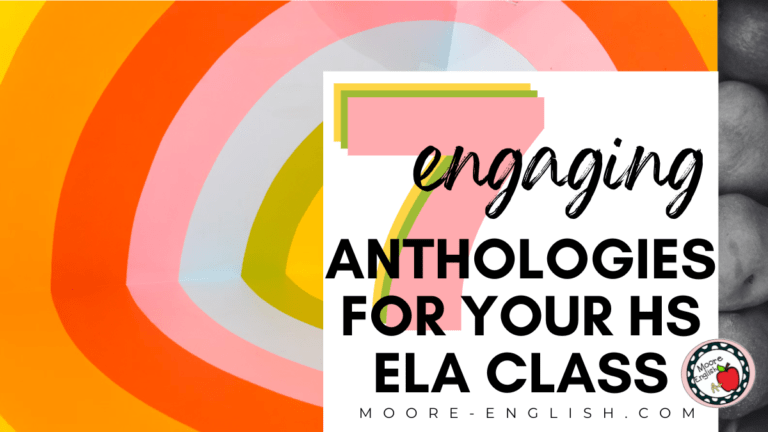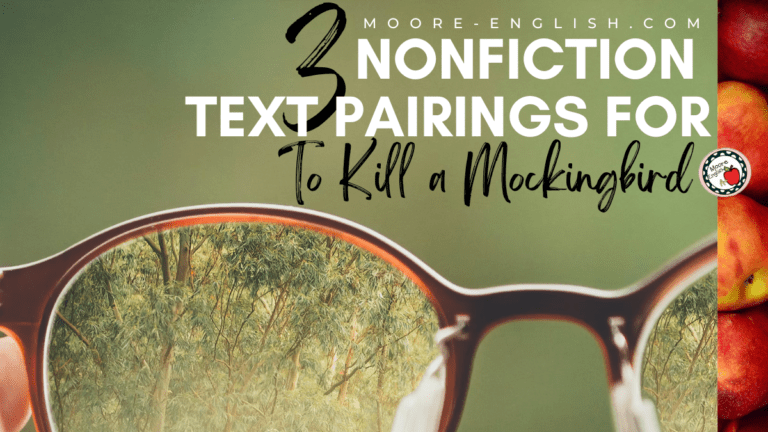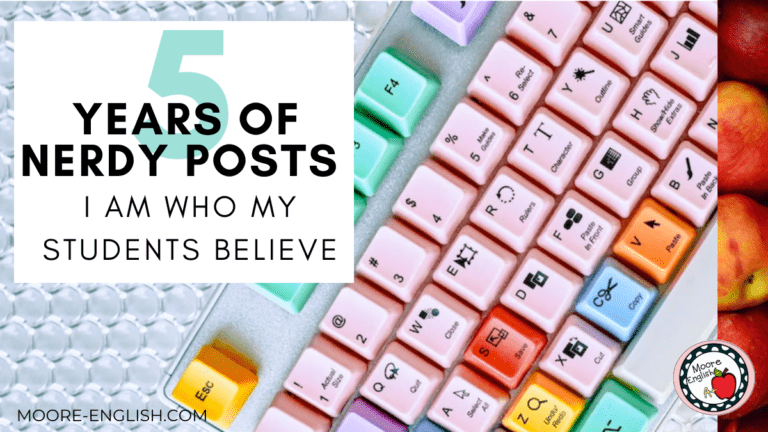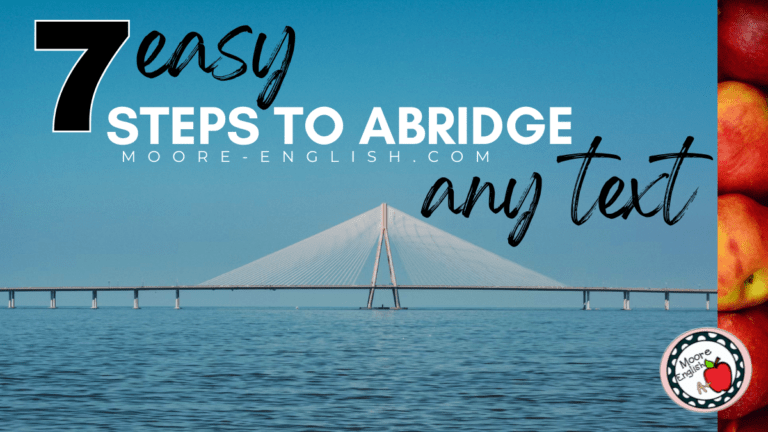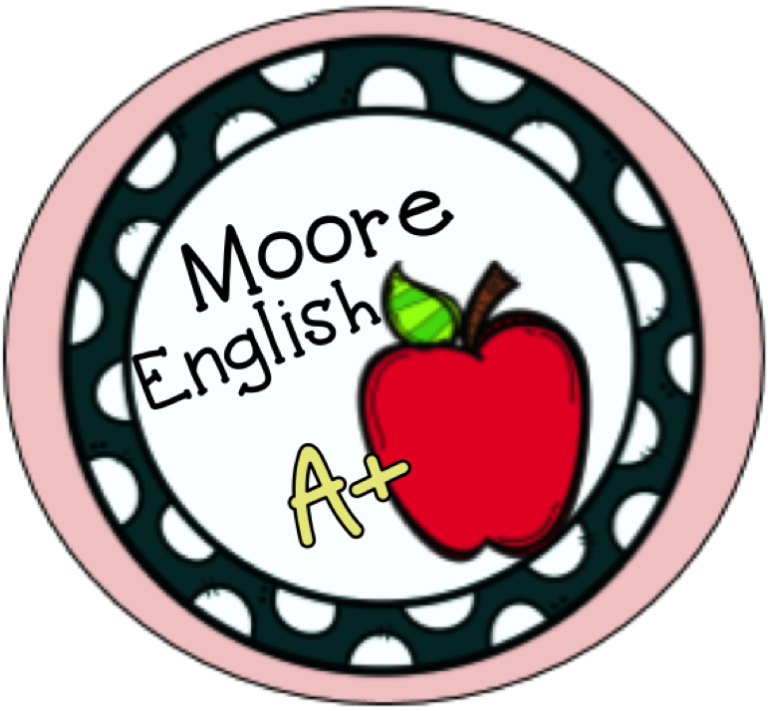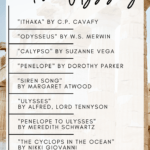A month after school ended, my principal called and asked if I would be willing to give up my advisory period in order to pick up a freshman class. I’d much rather teach than play hostess during advisory, so I jumped at the chance. Our building hasn’t had freshmen in decades, so this is a chance to break new ground, break some bad habits, and break in some new textbooks.
As the newly formed English I team started planning, we realized that we would need paired texts for teaching The Odyssey.
I love finding new texts, so I jumped into the research process. Needless to say, I found more resources than I could ever use, but in the interest of extreme preparation, I built lessons for everything. I also built my own version of The Odyssey with side-by-side questions and signposts from Notice and Note. Check it out here.
The most readily available paired texts for The Odyssey are poems. My unit on The Odyssey leans heavily on standards for vocabulary, figurative language, and annotation, so plenty of poetry was a perfect fit. All of the resources mentioned here are included in my The Odyssey Synthesis Bundle. They are also part of my The Odyssey Ultimate Bundle.

This post this post may contain affiliate links. Please read the Terms of Use.
Favorite Odyssey Poems
Since The Odyssey is quite long, there’s no way I could teach every single poem on this list. If I had to choose the 3 I most strongly recommend, it would be these texts. With these texts, students hit a variety of skills and concepts, and each poem provides its unique challenges, insights, and opportunities. These poems also provide me with an opportunity to teach students the 4 steps for pre-reading poetry.
“The Cyclops in the Ocean” by Nikki Giovanni is a favorite for teaching allusion. To understand the poem, students have to understand the Cyclops allusion. But students also have to understand Giovanni’s context for writing the poem. It’s a great piece for discussing the intersection of history and literature. The poem is hard to find online, so I’m sharing the first page of the activity I use with my students. Follow the link here, make a copy for your Drive, and you’ll have the first page for free.
“Odysseus” by W.S. Merwin is a piece I like to use after we’ve finished reading The Odyssey. As a closing activity, I ask students to work in groups to write the next “episode” in Odysseus’ journey. I’ve had some great student responses about Odysseus in a retirement home, about his future starring in heartburn commercials, and Penelope’s realization that she can do better. This poem is a great follow-up to that activity because its tone is so different from Homer’s heroic perspective of Odysseus. Check it out here.
“Siren Song” by Margaret Atwood is a delight! The scene with the sirens is well known but brief, so this poem helps students explore the idea of temptation and pride more fully. Check out the poem here.
Poems with Female Voices
When reading The Odyssey, it can be hard to find sympathetic female voices. Calypso and Circe are both temptresses. The Sirens, Scylla, and Charybdis are actual monsters. And Penelope is credited with cunning and loyalty, but even she has to be tested. Never mind that it was just assumed and expected that she was at home waiting. Anyway, for these reasons, I also like to incorporate some female voices into this unit and encourage students to think about how Homer’s portrayal of women may not be reality. With the right group, this can also be a window into literary criticism.
“Calypso” by Suzanne Vega is a song first, so I always have students listen while they read the lyrics. This is a great opportunity to hit some Common Core listening standards as well as the standards that challenge students to consider how medium affects message. Read the lyrics here.
“Penelope” by Dorothy Parker is full of Parker’s trademark acerbic wit. Although this poem is short, it’s a great tool for studying tone and point of view. What is Penelope’s tone? And how does her tone differ from Homer’s tone in The Odyssey? Check it out here.
“Penelope to Ulysses” by Meredith Schwartz is a poem I first encountered in our old textbook. Like other poems listed here, this one explores female voices. In particular, the idea of a letter provides a great basis for a conversation about form. A great follow-up to this poem is to have students write a letter in response. Check out the poem here.
Challenging Odyssey Poems
Of the poems described here, these are 3 I find to be the most challenging for students. Nevertheless, each one of these texts is worthy of consideration.
“An Ancient Gesture” by Edna St. Vincent Millay is challenging because it updates The Odyssey while also commenting on domesticity and masculinity. This is a poem that lends itself to partner annotations or works well as a teacher-guided annotation experience. Check it out here.
“Ithaka” by C.P. Cavafy is probably the poem on this list I see taught most often in conjunction with The Odyssey. That being said, I also think it’s one of the most challenging poems here. While some of the poems on this list are challenging because of their tone (“Penelope”) and others are challenging because of their vocabulary (“Ulysses”), “Ithaka” is challenging because of its ambiguity. Cavafy clearly uses Ithaka as a symbol, but he also makes clear that its meaning varies from person to person. On one hand, that gives the reader a large license for interpretation, which is fun. On the other hand, that freedom can be challenging for students who often want (or are being assessed) to find something concrete. Check it out here.
“Ulysses” by Alfred, Lord Tennyson is a challenging read, but I prepared it as an enrichment opportunity for students. When I teach this text, I like to show this clip from Skyfall to help students appreciate the poem’s tone and gravitas. To make this poem a little more manageable, I sometimes only teach half of the last stanza (from “Come…). Check out the poem here.
Coming Soon
Now that my unit on The Odyssey is coming to an end, I also want to share some of my favorite activities with you. Keep an eye out for an upcoming post focusing on the 3-4 lessons from this unit that I found the most valuable. In the meantime, check out my Pinterest board for mythology, and let us know what paired texts you use with The Odyssey.



